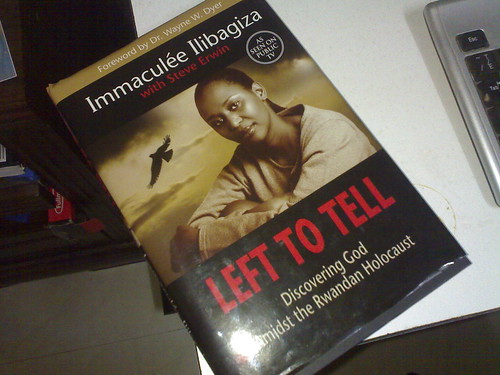Solidarity and subsidiarity are twin touchstones of Catholic social teaching. In general, these two principles are complementary and mutually enriching. In terms of the American polity, one thinks of the abolitionist cause and women’s suffrage movement of the nineteenth century as successful examples of what can be achieved by solidarity and subsidiarity. More recently, the late Pope John Paul II championed the Polish solidarity movement in the face of the totalitarian Soviet regime. What these nineteenth and twentieth century events share is a grassroots subsidiarity methodology wedded to great dreams of solidarity.
Thursday, June 17, 2010
Wednesday, June 16, 2010
Surrendering to Love
Tears stung my eyes tonight as I listened to the cathartic testimony of Ms. Immaculée Ilibagiza, a Rwandan genocide survivor. Ms. Ilibagiza held the Acton University audience spellbound with the harrowing account of her desperate struggle to elude discovery, along with seven other women, for 91 days in the cramped bathroom of a Good Samaritan Hutu pastor. Meanwhile, outside the relative safety of this claustrophobic latrine, machete-wielding death squads butchered a million or more of Ms. Ilibagiza’s Tutsi tribe and family, including her parents and two of her brothers. She described in a poignant and unforgettable way how her fear and terror slowly boiled over into rage, only to grudgingly, and ever so slowly, yield to love and forgiveness through frequent and fervent recitations of the Rosary.
Monday, June 7, 2010
Intermittent Blogging
Ironically, though I have more time to write than during the normal work year, I have been doing less writing of late. I attribute the discrepancy in writing output to time constraints and pressure on the writing end (during school) and quality family time on the leisure end (extended vacation). I will try to be more consistent, but I can't make any promises for the rest of the summer. I will stick to the topics I already mentioned in a previous post when I do find time to write. Thanks for your patience.
Thursday, June 3, 2010
On "Lost"
Plot: Oceanic Flight 815 crashes on an island with mysterious properties. The survivors adapt to their environment with grudging acceptance of their situation, but they never give up hope of returning to their former lives and loved ones.
Conflict: Six seasons of conflict with the “Others,” exiled “Others,” Dharma Initiative folk, and the smoke monster, not to mention one another and themselves from time to time.
Characters: Most redeeming aspect of the show by far. Jack, Sawyer, Kate, Sun and Jin, Hurley, Sayid, Ben, John Locke, Desmond Hume, Richard, Jacob, Charlie and Claire. You really fell in love with these people over the course of half a decade. I cried when many died. It was cathartic. I would be lying if I said otherwise.
Technique: Hybrid frame tale with island as the frame and flashbacks, flashforwards, and sideways [quasi-Purgatory] flashes, of particular characters as the individual short stories.
Allusion: Cultural smorgasbord, a veritable pastiche of religious-philosophical-scientific eclecticism,
postmodern mythology that doesn’t ultimately add up to anything coherent or cogent.
Soundtrack: Evocative in just the right way, at just the right time, in just the right proportion.
Special Effects: J.J. Abrams.
Verdict: Lovable characters played by solid actors made the show enjoyable. Bizarro storyline, however, made for a bait-and-switch mythology that promised so much, yet delivered so little. Note to self: You can’t be all things to all people, or you compromise the integrity of your narrative. Pick something and run with it for God’s sake!
Conflict: Six seasons of conflict with the “Others,” exiled “Others,” Dharma Initiative folk, and the smoke monster, not to mention one another and themselves from time to time.
Characters: Most redeeming aspect of the show by far. Jack, Sawyer, Kate, Sun and Jin, Hurley, Sayid, Ben, John Locke, Desmond Hume, Richard, Jacob, Charlie and Claire. You really fell in love with these people over the course of half a decade. I cried when many died. It was cathartic. I would be lying if I said otherwise.
Technique: Hybrid frame tale with island as the frame and flashbacks, flashforwards, and sideways [quasi-Purgatory] flashes, of particular characters as the individual short stories.
Allusion: Cultural smorgasbord, a veritable pastiche of religious-philosophical-scientific eclecticism,
postmodern mythology that doesn’t ultimately add up to anything coherent or cogent.
Soundtrack: Evocative in just the right way, at just the right time, in just the right proportion.
Special Effects: J.J. Abrams.
Verdict: Lovable characters played by solid actors made the show enjoyable. Bizarro storyline, however, made for a bait-and-switch mythology that promised so much, yet delivered so little. Note to self: You can’t be all things to all people, or you compromise the integrity of your narrative. Pick something and run with it for God’s sake!
Wednesday, June 2, 2010
On "Rashomon"
Akira Kurosawa’s “Rashomon” (1950) is a cinematic gem. There is a lot to chew on and mull over after watching this film. I could devote this post to the moral ambiguities of mankind symbolized by the motifs of darkness and light or rain and sunshine; however, I might also choose to consider the minimalist approach to set design or the riveting performances of the actors. And before I get lost in the minutiae, I better not forget to mention the avant-garde use of flashback and its consequent philosophical import relative to the characters’ conflicting perceptions of reality. Finally, I would be remiss if I didn’t at least mention the wonderful allegory of the human condition that Kurosawa crafts into this movie.
Subscribe to:
Posts (Atom)












